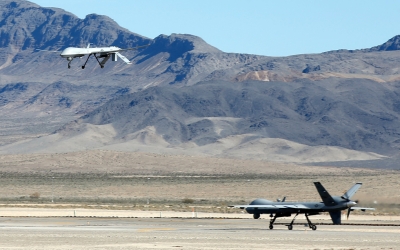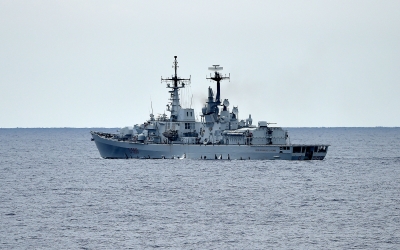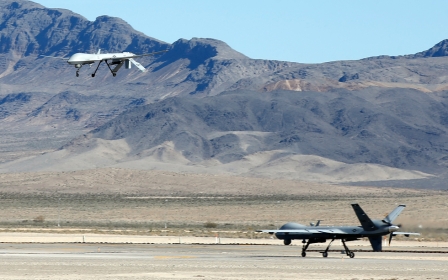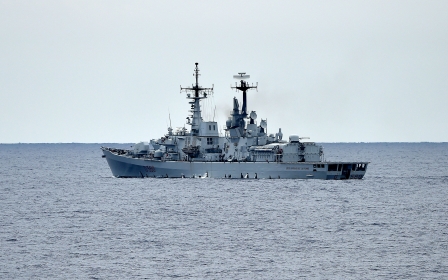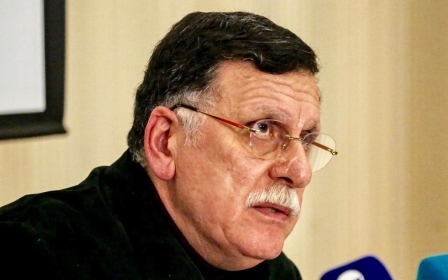Tripoli government suspends Libya talks after Haftar's forces shell capital's port
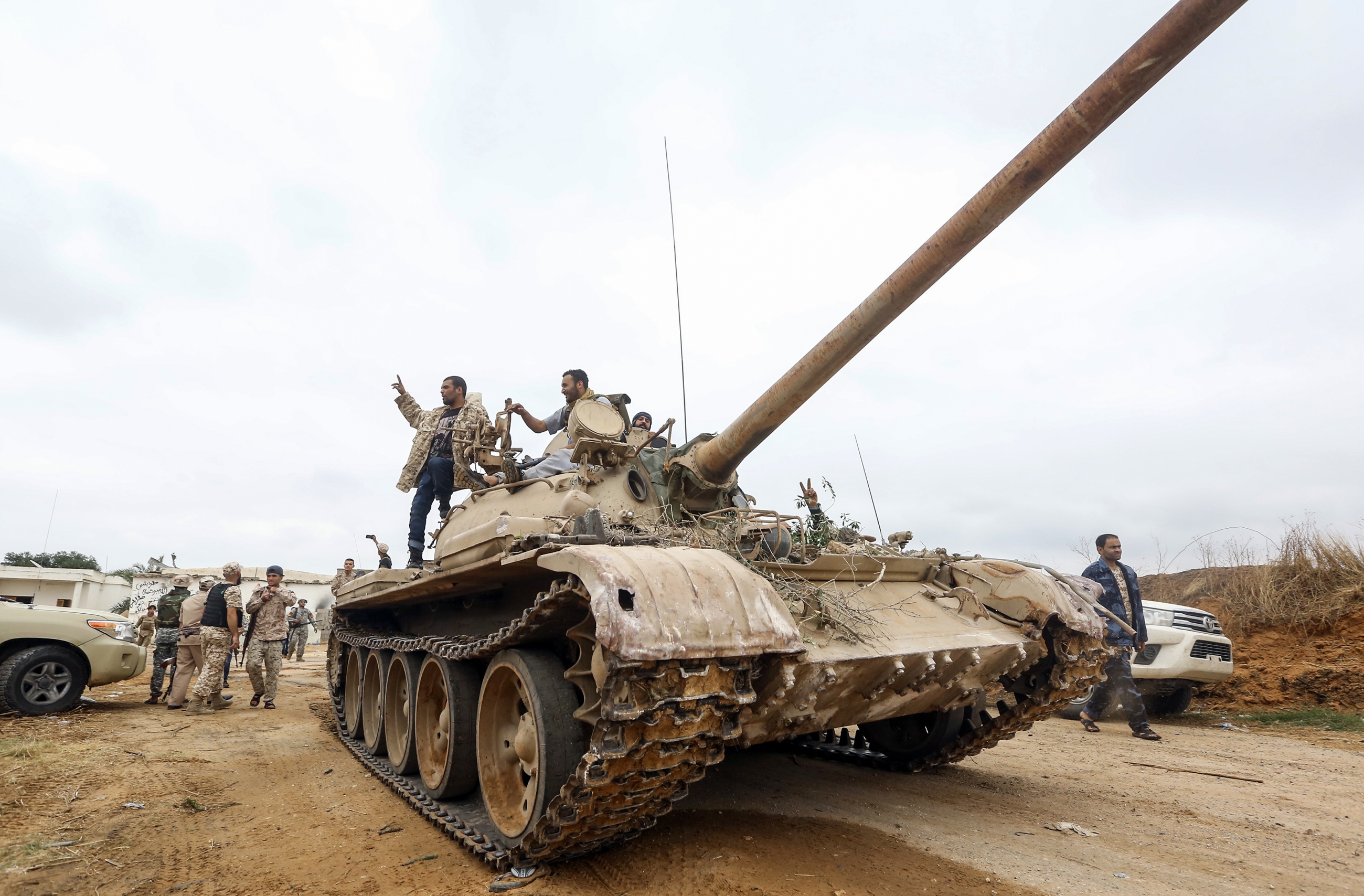
Libya's internationally recognised government on Tuesday suspended talks hosted by the United Nations to halt warfare over the capital after eastern forces shelled Tripoli's port, killing three people and almost hitting a highly explosive gas tanker.
The UN has been hosting ceasefire talks in Geneva between officials from the Tripoli government and the eastern-based Libya National Army (LNA), led by commander Khalifa Haftar.
Haftar has been trying to take the capital in a near year-long campaign which has displaced at least 150,000 people.
The LNA on Tuesday shelled Tripoli port, saying first it had attacked a Turkish vessel bringing weapons but saying later it had hit an arms depot. Three civilians were killed and five wounded, the Tripoli forces said.
The attack came just as the US ambassador Richard Norland was visiting Haftar in the first trip by a US envoy to eastern Libya since the killing of the US ambassador in a raid in 2012, Reuters reported.
New MEE newsletter: Jerusalem Dispatch
Sign up to get the latest insights and analysis on Israel-Palestine, alongside Turkey Unpacked and other MEE newsletters
In a response to the LNA attack, the Tripoli-based Government of National Accord (GNA) said in a statement that it had suspended its participation in ceasefire talks "until firm responses are taken against the attacker, and we will respond firmly to the attack in appropriate timing".
"Negotiations don't mean anything without permanent ceasefire guarantees returning the displaced people and the security of the capital and the other cities," it added.
UN condemnation
A source close to the talks told Reuters that UN Libya envoy Ghassan Salame was trying to convince the Tripoli delegation to stay in Geneva and resume the indirect talks.
Jean El Alam, a spokesman for the United Nations Libya mission, also said: "Delegations are still here (in Geneva) and Dr Salame has a meeting today with the head of the GNA delegation.
"The mission leadership is in contact with the GNA in Tripoli and member states to keep the momentum going."
In a separate statement, the UN mission said it was "expressing its strong and renewed condemnation of the bombing of Tripoli’s seaport yesterday by the Libyan National Army".
However, a defiant Prime Minister Fayez al-Sarraj, visiting the shelled port on Wednesday, rebuffed calls to return immediately to the negotiation table.
"There must first be a strong signal from all international players who are trying to talk to us," he told reporters, saying this also applied to parallel discussions focused on political and economic issues.
Suggesting fighting was likely to continue, he added: "We have an even stronger signal than that, which is defending our people."
Russian Defence Minister Sergei Shoigu met with Haftar and they agreed a political settlement is the only option for Libya, Russia's RIA news agency said on Wednesday.
The Geneva talks had been agreed by foreign powers backing the rival parties at a summit in Germany a month ago.
Western countries have largely watched passively as Libya fell apart since helping remove Muammar Gaddafi in 2011, opening the door for regional powers such as the United Arab Emirates, Egypt and Turkey to back rival camps fighting for control.
Large black holes
The port is a major entry gate for wheat, fuel and food imports but also a supply base for Turkey which has been sending arms, drones, trucks and soldiers to help Sarraj fend off the LNA.
Photographs showed containers in the port with large black holes in them.
State oil firm NOC said it had urgently evacuated all fuel tankers from the port after a missile struck metres away "from a highly explosive liquefied petroleum gas tanker discharging in the port".
"The city does not have operational fuel storage facilities... the consequences will be immediate; hospitals, schools, power stations and other vital services will be disrupted," NOC chairman Mustafa Sanalla said in a statement.
Since January, Turkey has sent several ships carrying arms and heavy trucks to Tripoli and Misrata, another western port allied to the Tripoli government, diplomats say.
It has also sent around 2,000 fighters from Syria's civil war to defend the capital.
The LNA is allied to a parallel government in eastern Libya supported by the UAE, Egypt, Jordan and Russian mercenaries. France has also given some support.
Eastern ports and airports are out of range of the Tripoli forces and its Turkish drones.
Talks with tribesmen
Tuesday's attack on the port unfolded as officers from the Tripoli forces and the LNA held a second round of indirect talks in Geneva to establish a permanent ceasefire.
Both sides refused again to sit in the same room, the UN's Salame said.
Salame added that he had received conditions from tribesmen allied to eastern forces to lift a blockade of eastern oil export ports, but said these were quite general and would have to be fleshed out in more UN-led talks in Geneva next week.
On Monday, EU foreign ministers said that they had agreed to launch a new mission in the Mediterranean Sea to enforce a UN arms embargo on Libya.
On Sunday, Stephanie Williams, the UN deputy special envoy for Libya, said the UN-backed arms embargo had become a joke and the country’s financial position was deteriorating rapidly.
Williams said: “The arms embargo has become a joke. We all really need to step up here.
"It’s complicated because there are violations by land, sea and air, but it needs to be monitored and there needs to be accountability.”
Middle East Eye delivers independent and unrivalled coverage and analysis of the Middle East, North Africa and beyond. To learn more about republishing this content and the associated fees, please fill out this form. More about MEE can be found here.


